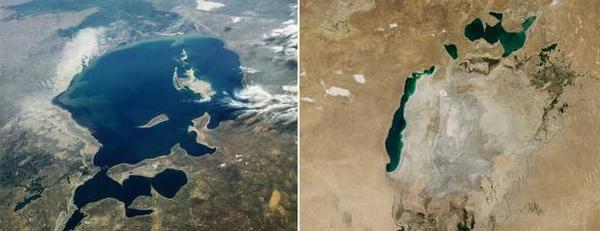NASA finds that Earth's fourth-largest lake is almost completely
dry
Images from NASA's Terra satellite
have revealed some alarming results. The Aral Sea in Kazakhstan, which once was
the fourth-largest lake in the world, is almost completely dry,The Independent reports.
The lake was once fed by two major rivers, the Syr Darya and the
Amu Darya, which flowed through the Kyzylkum Desert, meeting at the basin's
end. Scientists attribute the Aral Sea's decline to an irrigation project by the
Soviet Union in the 1960s, which took water from the rivers to turn the desert
into a farmland for cotton. The desert thrived, but the Aral Sea didn't fare as well.
The images, taken by the Moderate
Resolution Imaging Spectroradiometer on the Terra satellite, reveal that the
Aral Sea's eastern lobe has completely dried up. NASA began collecting the images in 2000,
when the effects of the '60s-era project were already evident. The photos show
that the Northern Aral Sea separated from the Southern Aral Sea, and the lake
has become "a fraction of what it had been before the irrigation project
started,"according to The Independent.
After the north and south parts of
the lake became divided, the lake's eastern lobe completely dried up in 2014,
NASA found. The lake's retreat has caused trouble for the local
communities, too — the water that's still in the Aral Sea has been polluted with fertilizer and pesticides, causing
a public health hazard, according to the NASA Earth Observatory. And "to
compound matters, more water has been taken from the rivers to flush out the
cropland affected by the contaminated dust that had blown up from the
lakebed," The Independentnotes, leading to colder winters and
warmer summers.
"This is the first time the
eastern basin has completely dried in modern times," Philip Micklin, an
Aral Sea expert at Western Michigan University, said in a statement for NASA's Earth Observatory. "And
it is likely the first time it has completely dried in 600 years."
Take a look at the Aral Sea's retreat in the images below.




No comments:
Post a Comment